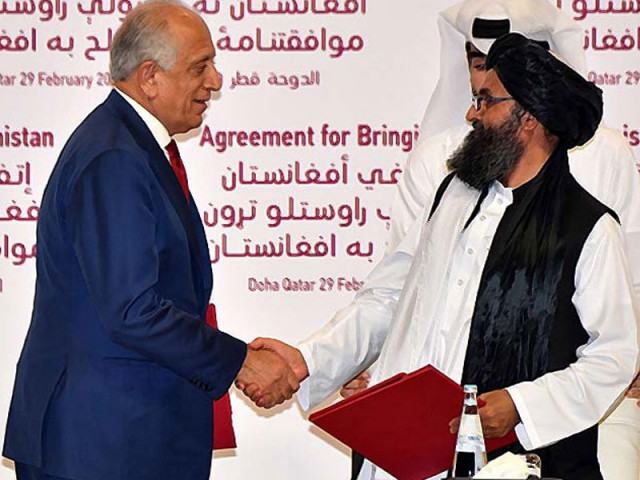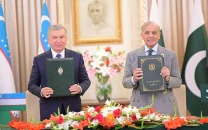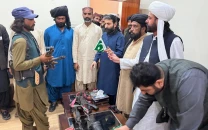Pakistan officially takes credit for facilitating Afghan peace
Move comes against backdrop of some negative statements from Afghan circles questioning Islamabad’s role

Pakistan has for the first time officially taken credit for facilitating not just the February 29 deal between the US and the Afghan Taliban but also talks between the Afghan government and the Taliban, as the intra-Afghan talks are set to resume next month in Doha after a 20-day break.
Islamabad played a key role in the Afghan peace efforts but this is the first time that the Foreign Office (FO) in a statement explicitly mentioned how Pakistan facilitated the US-Taliban deal as well as commencement of the intra-Afghan talks.
The statement has been issued by the FO against the backdrop of some negative statements emanating from both official and private Afghan circles questioning Pakistan's role.
"As the Afghan peace process is making encouraging progress towards a political solution to the conflict, Pakistan would like to reiterate its firm commitment for lasting peace and stability in Afghanistan," an official handout issued by the FO on Sunday read.
"While Pakistan’s efforts are acknowledged and appreciated by the Afghan society and the international community, we are concerned about some negative comments which continue to emanate from certain official as well as unofficial Afghan circles," it added.
The statement noted that Pakistan would continue to emphasise the mutually agreed fundamental principle that all bilateral issues, including security and intelligence matters, should be addressed through relevant bilateral forums and channels.
Appropriate institutional forums were in place for such discourse in the relevant Working Groups of APPAPS.
In addition, during the visit of Prime Minister Imran Khan to Kabul in November 2020, the two sides also agreed on further strengthening their contacts on matters related to security and peace process.
"We wish to highlight that the public blame game is detrimental to the Afghan peace process as well as to our shared efforts for enhancing bilateral cooperation."
The FO said Pakistan continued to emphasise that there was no military solution to the Afghan conflict and solution through a political process was the only way forward.
"Towards this end, Pakistan has been engaged in serious efforts to facilitate an Afghan-led, Afghan-owned peace process. During the current year, our long-held position was vindicated and Pakistan’s serious efforts facilitated important breakthroughs in the peace process, including: (a) US-Taliban Peace Agreement of 29 February; (b) commencement of Intra-Afghan Negotiations on 12 September; and (c) agreement among Afghan parties on the Rules and Procedures on 2 December 2020," the statement said.
It is believed that breakthrough in Afghan peace process would not have been possible had Pakistan not played a role.
The FO observed that as the intra-Afghan talks entered a crucial phase on January 5, it was important for all sides to avoid the blame game.
The next phase, which is set to begin in Qatar despite offer by President Ashraf Ghani to host talks in Kabul, would focus on substantive issues, including the political future of Afghanistan and a comprehensive ceasefire.
"Pakistan has also continued to express its deep concern at the increasing level of violence in Afghanistan during the current year. The prime minister of Pakistan, on several occasions, has reiterated his calls for reduction in violence leading to a ceasefire," the statement maintained.
"It is important to underline the need for the Afghan government to take pro-active measures to fulfil its responsibility for internal security, law and order and protection of Afghan lives. Pakistan stands ready to extend all possible cooperation in the area of security and effective border management through effective institutional collaboration."
It also referred to the recent positive trajectory witnessed in bilateral relations with significant progress on important bilateral matters, including revision of APTTA and commencement of negotiations on PTA.
"High-level leadership contacts and bilateral visits, including that of the prime minister of Pakistan, are a manifestation of further strengthening of Pakistan-Afghanistan relations. The two sides must continue to build on the momentum and prevent domestic and regional detractors from their subversive designs.
"Pakistan desires and continues to support a peaceful, stable, united, independent, democratic, sovereign and prosperous Afghanistan. It is important that Afghans should seize this historic opportunity for reaching an inclusive, broad-based and comprehensive political settlement to bring an end to the decades-long internal conflict in Afghanistan," the statement concluded.



















COMMENTS
Comments are moderated and generally will be posted if they are on-topic and not abusive.
For more information, please see our Comments FAQ